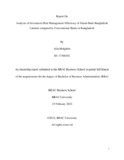Analysis of investment risk management efficiency of Islami Bank Bangladesh Limited compared to conventional banks in Bangladesh
Abstract
BBS students must do an internship in order to graduate from BRAC University. So, I finished
my internship with Islami Bank Bangladesh Limited, one of Bangladesh's most reputable banks.
The effectiveness of Islami Bank Bangladesh Limited's investment risk management has been
highlighted in this report, along with a comparison to three selected conventional banks. The
entire report has been divided into three chapters for ease of analysis.
The first chapter covered an overview of internships. The internship details, the conclusion of my
internship, the services I contributed to my company, and how I benefited working as an intern
are all discussed in this chapter, along with some recommendations for future IBBL internship
programs.
The second chapter examines IBBL's overview, operations, and strategic audit. The goal,
technique, scope, and importance of evaluating this chapter were outlined in the first section of
this chapter. Ratio analysis, secondary data collecting, primary data collection, SWOT analysis,
and Porter's five forces were all employed to analyze this chapter. This chapter also recapitulates
management practices such as risk management and human resource management, the financial
information analysis over the past five years, including deposit, investment, and asset amounts.
Islami Bank Bangladesh Limited's comparative and industry analysis over the past five years has
been examined utilizing SWOT analysis, Porter's Five Forces Analysis, and Ratio Analysis.
Also, some suggestions have been provided for IBBL in the light of this chapter.
The effectiveness of IBBL's investment risk management, as well as comparisons with three
traditional banks, are reviewed in Chapter 3. Ratio analysis is one of the ways that has been
utilized to complete this study. Furthermore, primary and secondary sources were employed to
gather data. Different ratios were calculated to assess the bank's risk management efficiency, and
the data was collected over a five-year period. The average of five years' ratios was used for
comparison purposes. By evaluating this chapter, the suggestion for IBBL has been proven at the
end of this chapter.
As a result, IBBL's total investment performance is improving day by day. Because the majority
of our country's citizens are religious and desire to invest their money in accordance with Islamic
Shariah. Furthermore, as compared to other private commercial banks in the nation, IBBL allows
people from all walks of life to trade with ease.

